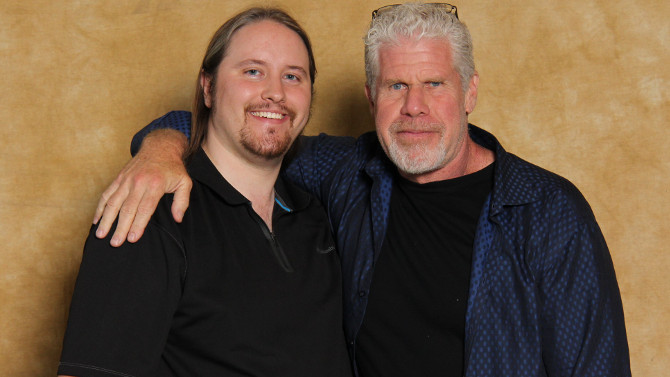Guillermo del Toro has quickly elevated himself to the level of super-stardom. The horror leaning director crafts loving stories that revolve around the monsters that haunt our nightmares, concocting vivid worlds that both touch our hearts as well as stop them – using stunningly crafted eerie atmospheres and shocking spectacles to succeed.
So, I thought that I would reflect back on the director’s first motion picture, 1993’s Cronos. Written and directed by the horror maestro, the film contains many of his staples that we have come to know and love – including rich characters, gothic horror elements, a fix of Ron Perlman, as well as countless other things.
The uncanny tale is, at its heart, a love story. Our lead is an elderly gentleman named Jesus Gris (Federico Luppi), a man who runs an antique shop and loves all things history. He has a special bond with his granddaughter Aurora (Tamara Shanath); he raises the girl with his wife Mercedes (Margarita Isabel). Taking the young girl to his shop, the two discover a mysterious golden egg found within an ancient hollow archangel statue – after some slithery bugs seep out of its missing eye.
To briefly flash back, del Toro sets this up by way of an introduction at the very beginning of the movie, where we learn that an alchemist developed the cronos device, living for more than four centuries until a collapsing building led to his heart being impaled and ending his prolonged existence. It is an intriguing piece of mythology which sets up the tale that analyses the benefits and perils of immortal life.
Reminiscent of the philosophical debate around the chicken and the egg, this device is a symbol of eternal life. The tinkering man decides to wind up the device, and surprisingly, legs exit from the cryptic egg, much like a spider, attaching to his hand and in a sense, biting him.
This bizarre happening changes the man. Not only does he shave his mustache, which makes him look years younger (or was it just the mustache?), but he also seems more disturbed when copious amounts of light seep into their house. His behaviour also slowly changes over time.

Filmizon.com’s Nikolai Adams with Ron Perlman, who plays Angel de la Guardia in Guillermo del Toro’s first film, Cronos – they have worked together six times thus far
Soon after the incident, a gargantuan man by the name of Angel de la Guardia (Ron Perlman) enters his shop, looking specifically for such a statue. He purchases it, returning the historic piece to his ailing uncle De la Guardia (Claudio Brook), a wealthy man who is looking for a way to prolong his life as he fades away in a germ proof box. Surrounded by similar archangels, the sickly man has spent many long years searching for the supposed item that will extend his life.
Facing two very difficult situations, Gris must attempt to evade the prying hands of the wealthy and desperate millionaire, while also dealing with the seeming addiction that comes along with using this item. As you will likely guess, he does use it again, this time letting it complete the cycle; a scorpion-like tail extends out, piercing his skin and draining his blood.
Soon, the elderly man is having cravings for blood and it is clear that he is having some sort of vampiric urges. Despite this monstrous transformation, the young girl still loves and cares for him. She sees the effect the aged item is having on her beloved grandfather, yet when she tries to hide it from him, he comes looking for it – and she finally gives in after he desperately pleads for it.
The young de la Guardia is always hot on his trail, though he does not know what he is dealing with. Finally, nabbing him and thinking that he has killed the man, things are not what they seem. Gris, now resembling a Frankenstein-like monster (with staples and cuts defacing his visage following the beating and mortician’s work), makes his way out of his casket just prior to cremation. Will he be able to regain some semblance of humanity as well as win the battle, or will he descend into darkness or lose his life?
Developing a moving story, del Toro adds an interesting new level to vampire lore. With a bug being held within the cronos machine, it is this insect that transforms the man into an everlasting beast. Though, the heart of the tale comes from the relationship between the grandfather and his granddaughter. It is touching to see how the young girl loves him unconditionally, caring for him even as he devolves into a more primordial, savage being. She sees the pain that light causes him and she creates her own casket to house him in during the brightness of day. It tells us that we should love our family despite their flaws.
Though not as rich as his films to come, Cronos highlights the fascinating mind of the macabre man and illustrates the purity that he weaves into his fantastical motion pictures. Feeling like a dark fable for life, his work often harkens us back to the golden age of monster movies – fitting in with classics like Dracula, Frankenstein, The Wolf Man and so many other memorable horror films. So, take the plunge and see this early work from a modern master, it will leave you transformed.


I will have to find this one. It sounds tragic, yet beautiful.